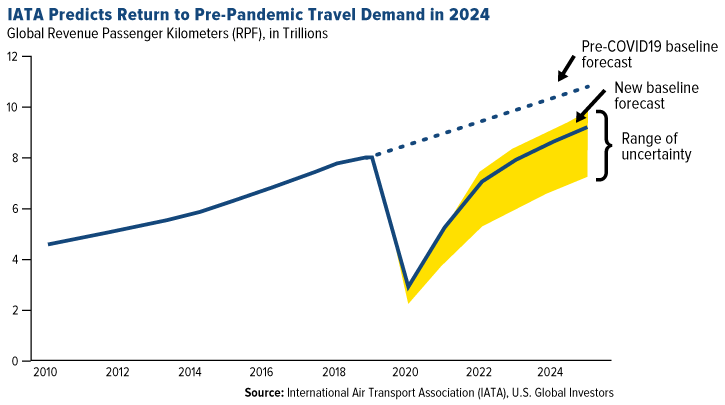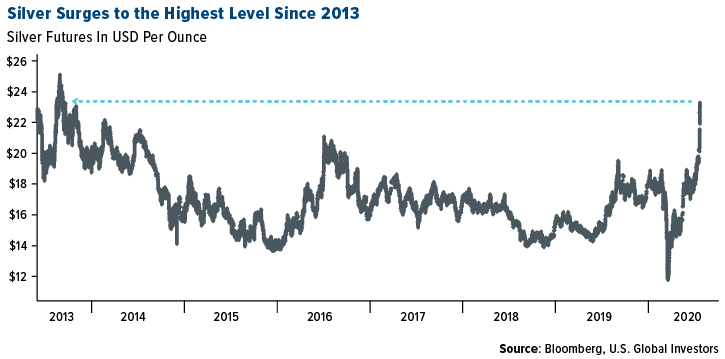Please consider carefully a fund’s investment objectives, risks, charges and expenses. For this and other important information, obtain a statutory and summary prospectus for JETS here, GOAU here, SEA here and for WAR here. Read it carefully before investing.
Investing involves risk, including the possible loss of principal. Shares of any ETF are bought and sold at market price (not NAV), may trade at a discount or premium to NAV and are not individually redeemed from the funds. Brokerage commissions will reduce returns. Because the funds concentrate their investments in specific industries, the funds may be subject to greater risks and fluctuations than a portfolio representing a broader range of industries. The funds are non-diversified, meaning they may concentrate more of their assets in a smaller number of issuers than diversified funds. The funds invest in foreign securities which involve greater volatility and political, economic and currency risks and differences in accounting methods. These risks are greater for investments in emerging markets. The funds may invest in the securities of smaller-capitalization companies, which may be more volatile than funds that invest in larger, more established companies. The performance of the funds may diverge from that of the index. Because the funds may employ a representative sampling strategy and may also invest in securities that are not included in the index, the funds may experience tracking error to a greater extent than funds that seek to replicate an index. The funds are not actively managed and may be affected by a general decline in market segments related to the index. Airline Companies may be adversely affected by a downturn in economic conditions that can result in decreased demand for air travel and may also be significantly affected by changes in fuel prices, labor relations and insurance costs. Gold, precious metals, and precious minerals funds may be susceptible to adverse economic, political or regulatory developments due to concentrating in a single theme. The prices of gold, precious metals, and precious minerals are subject to substantial price fluctuations over short periods of time and may be affected by unpredicted international monetary and political policies. We suggest investing no more than 5% to 10% of your portfolio in these sectors.
Foreign and emerging market investing involves special risks such as currency fluctuation and less public disclosure, as well as economic and political risk. By investing in a specific geographic region, such as China and/or Taiwan, a regional ETFs returns and share price may be more volatile than those of a less concentrated portfolio.
Cargo Companies may be adversely affected by downturn in economic conditions that csn result in decreased demand for sea shipping and freight.
Aerospace and Defense compani es are subject to numerous risks, including fierce competiti on, adverse political, economic and governmental developments, substantial research and development cos ts. Aerospace and defense companies rely heavily o n the U.S. Government, political support and demand for their products and services.
Companies in the cybersecurity field face intense competition, both domestically and internationally, which may have an adverse effect on profit margins. The products of cybersecurity companies may face obsolescence due to rapid technological develop ment. Companies in the cybersecurity field are heavily dependent on patent and intellectual property rights.
Competitive pressures may have a significant effect on the financial condition of semiconductor companies and may become increasingly subject to aggress ive pricing, which hampers profitability. Semiconductor companies typically face high capital costs and can be highly cyclical, which may cause the operating results to vary significantly. The stock prices of companies in the semiconductor sector have been and likely will continue to be extremely volatile.
Investments in the securities of non-U.S. issuers may subject the Fund to more volatility and less liquidity due to currency fluctuations, political instability, economic and geographic events. Emerging markets may pose additional risks and be more volatile due to less information, limited government ov ers ight and lack of uniform standards.
Fund holdings and allocations are subject to change at any time. Click to view fund holdings for JETS, GOAU, SEA and for WAR.
Distributed by Quasar Distributors, LLC. U.S. Global Investors is the investment adviser to JETS, GOAU, SEA and WAR.
The U.S. Global Jets Index seeks to provide access to the global airline industry. The index uses various fundamental screens to determine the most efficient airline companies in the world, and also provides diversification through exposure to global aircraft manufacturers and airport companies. The index consists of common stocks listed on well-developed exchanges across the globe. It is not possible to invest directly in an index.
The U.S. Global GO GOLD and Precious Metal Miners Index uses a robust, dynamic, rules-based smart-factor model to select precious minerals companies that earn over 50% of their aggregate revenue from precious minerals through active (mining or production) or passive (royalties or streams) means. The index uses fundamental screens to identify companies with favorable valuation, profitability, quality and operating efficiency. The index consists of 28 common stocks or related ADRs.
The U.S. Global Sea to Sky Cargo Index is a 29-stock index that seeks to provide diversified access to the marine shipping, air freight and courier, and port and harbor industries. The index uses various fundamental screens to determine the most efficient marine shipping, air freight and courier, and port and harbor companies in the world. The index consists of common stocks listed on developed and emerging market exchanges across the globe.
The WAR ETF is actively managed and there is no guarantee the investment objective will be met. The fund is new and has a limited operating history to evaluate. The Fund is non-diversified, meaning it may concentrate its assets in fewer individual holdings than a diversified fund.
The WAR ETF's concentration in the securities of a particular industry namely Aerospace and Defense, Cybersecurity and Semiconductor industries as well as geographic concentration may cause it to be more susceptible to greater fluctuations in share price and volatility due to adverse events that affect the Fund's investments.
It is not possible to invest in an index.
Smart beta 2.0 combines the benefits of passive investing and the advantages of active investing strategies.
Quant investing, or quantitative analysis, is the use of statistical models in investment management.
Please consider carefully a fund’s investment objectives, risks, charges and expenses. For this and other important information, to obtain a hardcopy statutory and summary prospectus call 844.ETF.JETS (844.383.5387). Read it carefully before investing.
Investing involves risk, including the possible loss of principal. Shares of any ETF are bought and sold at market price (not NAV), may trade at a discount or premium to NAV and are not individually redeemed from the fund. Brokerage commissions will reduce returns. Because the fund concentrates its...
Read More



